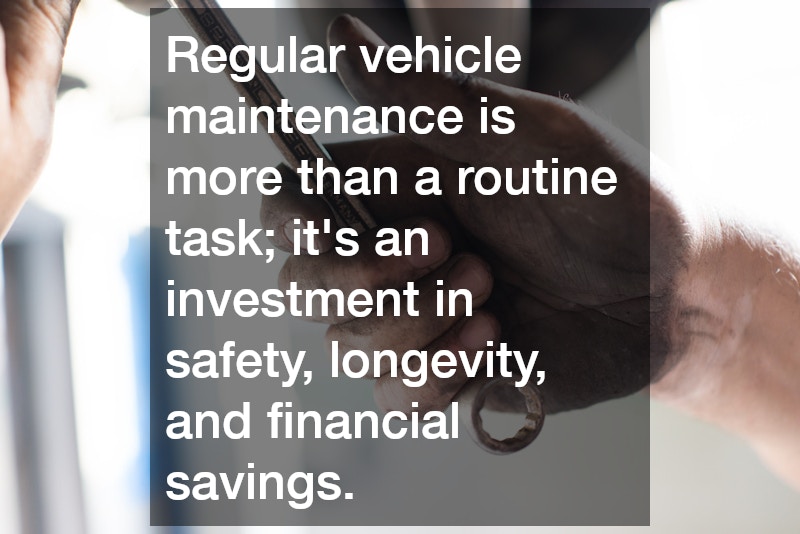Why Vehicle Maintenance Matters More Than You Think

Understanding Manufacturer Recommendations
Manufacturers provide a schedule that specifically suits your vehicle model. Following these guidelines ensures that your car operates at its peak performance and prevents unnecessary damage to critical components. By adhering to the manufacturer’s maintenance schedule, you can mitigate costly repairs and enhance the vehicle’s lifespan.
Each brand and model has unique needs and recommended intervals for maintenance tasks. These guidelines are derived from extensive testing and engineering insights specific to the vehicle’s design.
It is paramount to review and understand these intervals to align maintenance tasks with these specialized requirements.
Manufacturers’ recommendations are often overlooked due to misconceptions about maintenance costs. However, following these protocols is a cost-effective approach compared to the potential expense of major repairs arising from neglected maintenance. Regular compliance also reinforces the warranty provisions, safeguarding against unforeseen liabilities.
The Role of Mileage and Time
An essential factor in determining maintenance frequency is balancing mileage and time intervals, as both influence the wear and tear of vehicle components. High mileage can accelerate the need for certain services like oil changes and brake inspections. Conversely, time-based checks ensure that even infrequently driven vehicles remain in good condition.
Vehicle components degrade naturally over time, regardless of usage patterns. Elements such as engine oil can lose their efficacy, and rubber parts like belts may become brittle. Therefore, time-based maintenance is crucial for detecting such issues before they manifest into major mechanical problems.
Considerations for Different Driving Conditions
Driving habits and environmental conditions can necessitate more frequent maintenance checks. Urban driving typically involves short trips, frequent stops, and starts, resulting in higher strain on brakes and the engine. In contrast, rural driving might involve longer distances, exposing the vehicle to more debris and requiring frequent checks on air filters.
Extreme climates further impact maintenance needs; hot weather can lead to overheating issues, while cold weather might affect battery performance. Dusty or dirty environments increase the frequency of air filter changes and necessitate vigilant checks on cooling systems. Each of these conditions underscores the importance of a custom-tailored maintenance schedule that reflects the actual environmental challenges faced by the vehicle.
What are the Consequences of Skipping Regular Maintenance?
Short-term Mechanical Issues
Skipping regular checks can lead to immediate mechanical failures such as oil sludge build-up, brake wear, or battery issues. These failures not only inconvenience the driver but also compromise the safety and reliability of the vehicle. Over time, neglected maintenance exacerbates these problems, leading to potentially expensive repairs and replacements.
Oil sludge build-up is a common issue resulting from infrequent oil changes and can severely damage engine internals. Brake systems, vital for safety, experience increased wear without regular inspections, potentially leading to brake failure. Additionally, battery performance deteriorates without periodic checks, at times resulting in unexpected breakdowns.
Long-term Costs and Depreciation
Lack of maintenance not only results in more expensive repairs over time but also accelerates vehicle depreciation, affecting resale value. Vehicles with a detailed maintenance record often attract higher resale prices due to perceived reliability. Thus, regular maintenance is a sound investment that retains a vehicle’s market value and reduces total ownership cost.
Deferred maintenance disproportionately increases repair costs as minor issues evolve into significant, costly problems. For example, a simple oil change can prevent much more expensive engine repairs down the line. By attending to these minor tasks, owners mitigate major financial outlays.
Safety Hazards
Vehicle neglect significantly increases the risk of accidents due to brake failures, tire blowouts, or engine malfunctions. Brake systems, integral to the car’s safety, can become compromised without regular checks and prompt repairs. Similarly, worn tires are prone to blowouts, especially at high speeds, posing a direct risk to life and property.
Furthermore, unchecked engine malfunctions can lead to abrupt stoppages or severe mechanical failures, creating hazardous situations. These outcomes often result from neglected routine checks that otherwise would have identified these faults promptly. The financial implications of such accidents, compounded by potential liabilities, emphasize the necessity of regular maintenance.
What are the Essential Vehicle Maintenance Tasks?
Basics: Oil Changes and Tire Rotations
Regular oil changes and tire rotations are foundational tasks that preserve engine health and ensure efficient fuel consumption and tire lifespan. They form the bedrock of any comprehensive vehicle maintenance strategy, addressing immediate and long-term performance aspects. Routine changes maintain engine lubrication, which is vital for minimizing friction among engine parts.
Oil changes at recommended intervals prevent the accumulation of debris and sludge, optimizing engine cleanliness and performance. Concurrently, tire rotations distribute wear evenly across all tires, enhancing grip and extending tire life. These simple yet highly effective tasks can prevent more intricate and costly repairs in the future.
Following manufacturer’s recommendations for these tasks can significantly enhance both vehicle performance and fuel efficiency. Tire rotation, crucially, maintains balance and stability, directly influencing steering and braking responsiveness. These essential practices underscore how routine tasks can yield substantial dividends in safety, efficiency, and cost savings.
Inspecting and Replacing Fluids and Filters
Periodic inspection and replacement of fluids and filters, such as transmission fluid and air filters, are crucial for vehicle performance. Appropriate fluid levels and clean filters ensure the vehicle runs smoothly and efficiently, preventing overheating and reduced power output. This maintenance aspect extends to diverse systems, including hydraulic, cooling, and air intake.
Regular vehicle maintenance is more than a routine task; it’s an investment in safety, longevity, and financial savings. Understanding and implementing essential maintenance practices will keep your vehicle running smoothly and securely for years to come. Proactively attending to maintenance tasks mitigates risks of mechanical failures, reduces repair costs, and ensures optimal performance and value retention for your vehicle.

